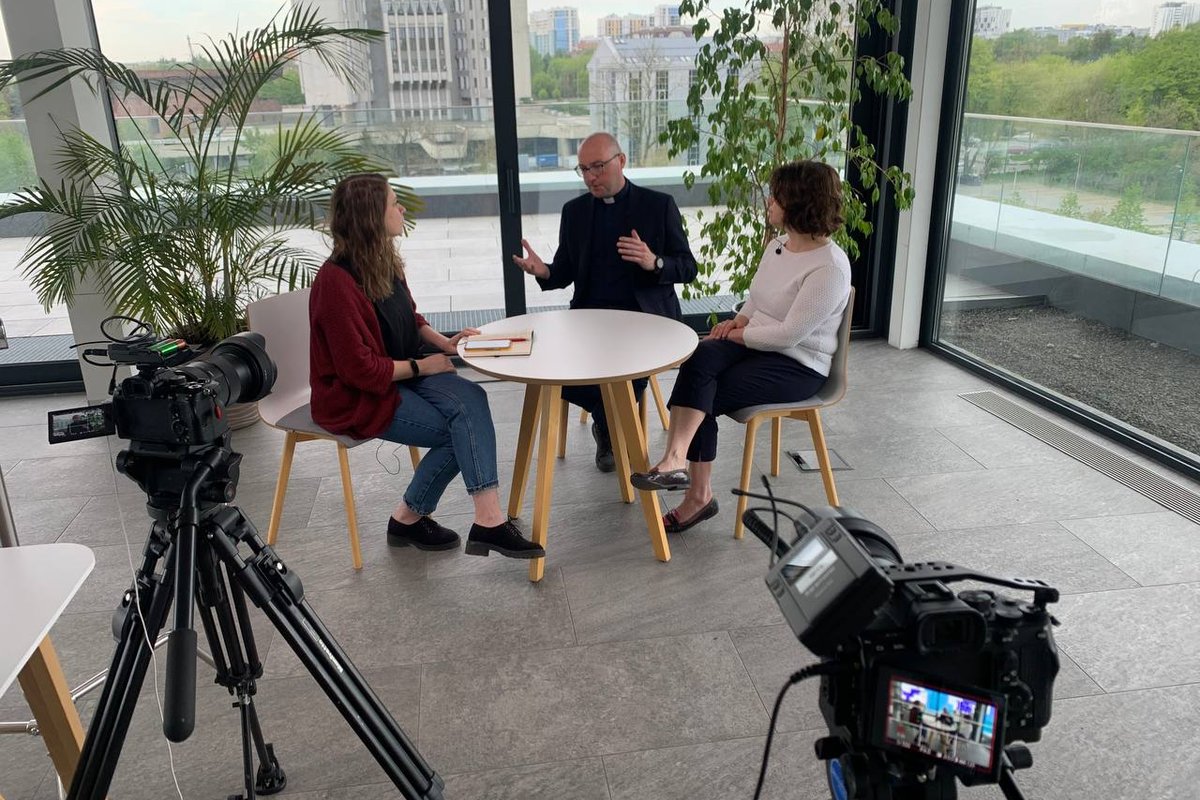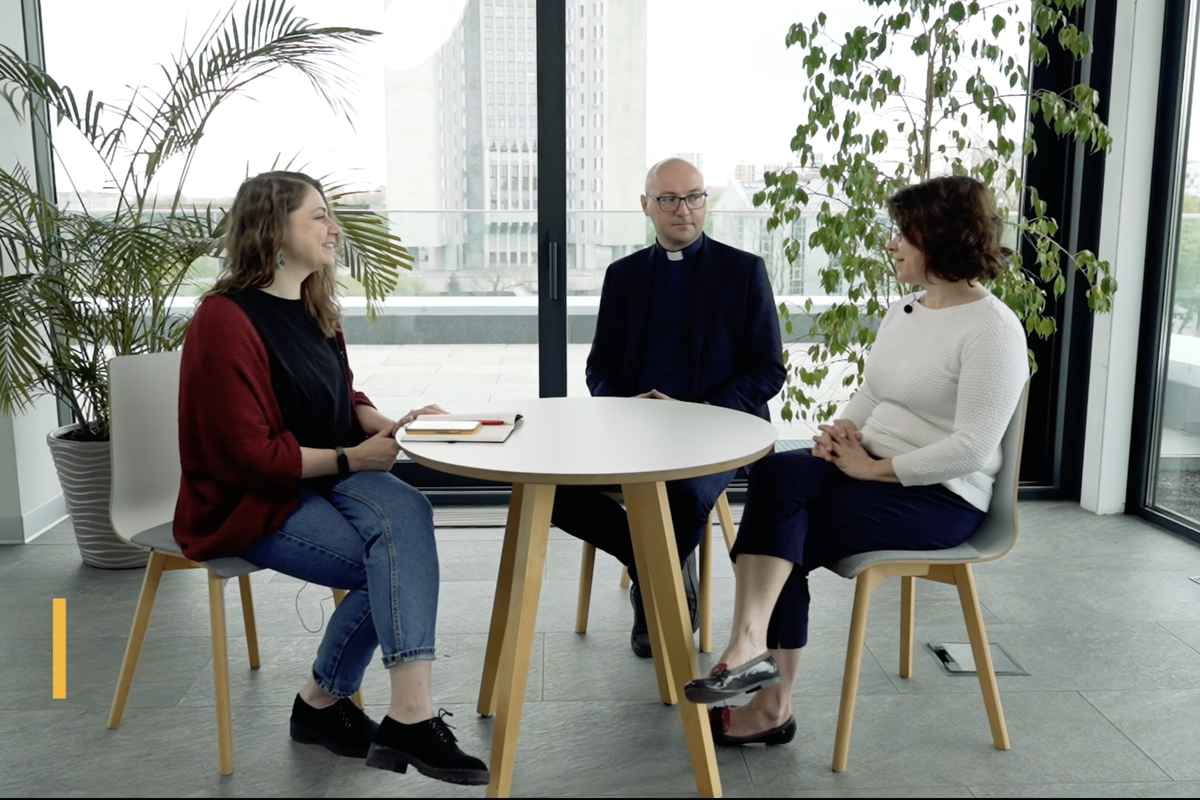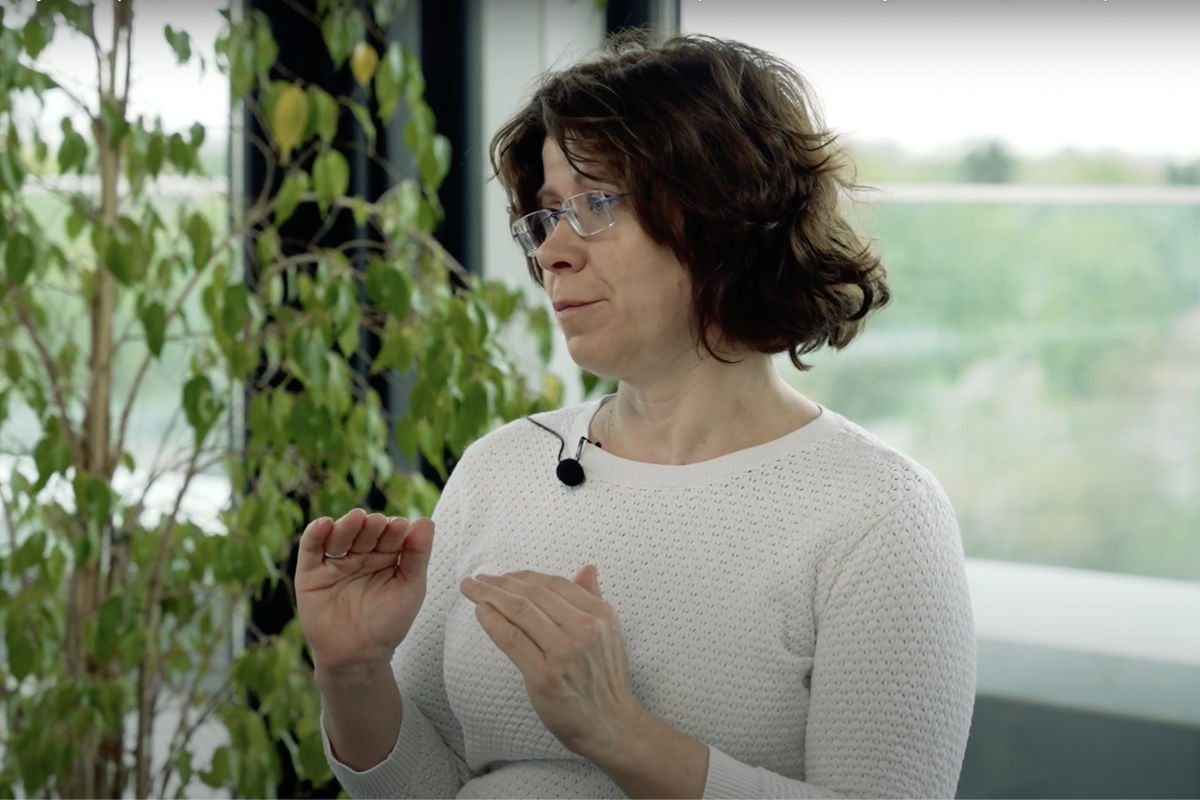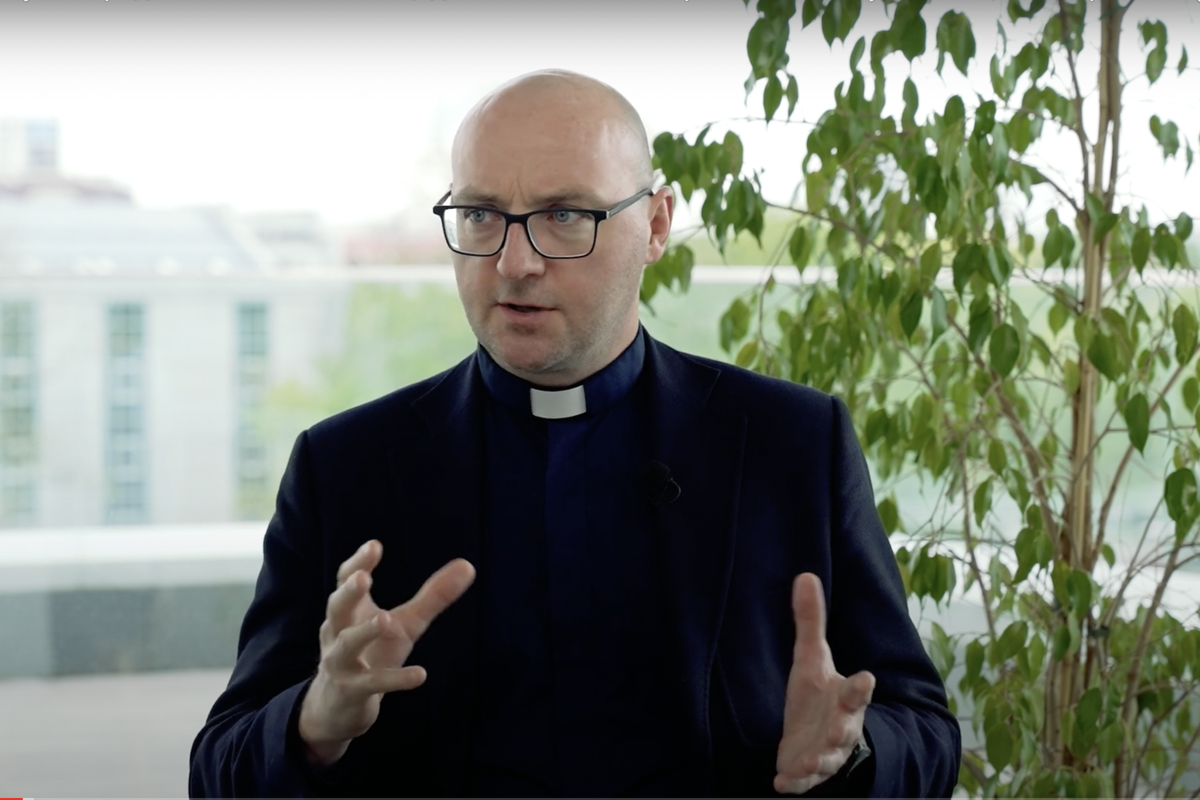The system of protection of minors and vulnerable persons in the Catholic Church of Poland (excerpt from an interview)
As part of the presentation of the international project "SAFEGUARDING. Child Safety in the Environment of the Church" in Lviv, Father Piotr Studnicki, head of the Office of the Delegate of the Conference of Polish Bishops for the Protection of Children and Youth, and Marta Titaniec, president of the St. Joseph Foundation of the Conference of Polish Bishops, spoke about the experience of protecting minors and vulnerable persons in the Catholic Church of Poland. The interview was conducted by Ivanka Rudakevich, head of projects and programs of the Center for Child Dignity of UCU, coordinator of the international project "SAFEGUARDING. Safety of the child in the environment of the church".
Ivanka Rudakevich, head of projects and programs of the Center for Child Dignity of UCU, coordinator of the international project "SAFEGUARDING. Child safety in the church environment":
- Thank you very much for coming to Ukraine and agreeing to this interview. I will immediately go to the questions. When I read your report, I saw that since 2012, work on the topic of child protection began. What is the child protection system at the level of the Catholic Church in Poland?
- Marta Titaniec, president of the St. Joseph Foundation of the Bishops' Conference of Poland:
The system consists of two levels: national and local. Local structures are delegates, people who receive appeals from victims of violence. The second group is the pastors of the affected persons, their families and communities, who offer pastoral care and spiritual support. The third group is curators responsible for accused and convicted priests. The fourth group is responsible for the prevention of violence. Such a system operates in every diocese and in every male monastic order, but some of these positions also exist in female monastic orders.
At the central level, there is a delegate for the protection of children and youth. Today, he is Archbishop Wojciech Polyak, Primate of Poland. We also have a child and youth protection coordinator - Father Adam Jacques, a Jesuit who founded the Child Protection Center at the Ignatianum University in Krakow. There is also the Delegate's Bureau, headed by Father Piotr Studnicki, and the St. Joseph Foundation, both of which are subjects of the Episcopal Conference of Poland (now the Foundation is headed by Marta Titaniec).
In addition, there are auxiliary institutions, in particular, the Institute of Statistics of the Catholic Church, which is responsible for the research part of the work, as well as the Council under the Delegate, which unites representatives of all these groups. We meet twice a year.
- What is the proportion of clergy, laity, women, and men in these all-Polish and diocesan structures?
- o. Piotr Studnicki, head of the Office of the Delegate of the Conference of Polish Bishops on the Protection of Children and Youth:
This system was created primarily from the clergy and consecrated persons. They make up approximately 90%. Delegates and pastors are mostly priests and nuns. At the all-Polish level, there are also lay people who work at the St. Joseph Foundation and the Child Protection Center. Some dioceses appoint secular persons, mainly women, as delegates for the protection of children and youth. We firmly believe that it would be good if there were more women in this system. Because the victims of sexual violence, for example, by a priest, have the right to have a choice to whom to inform, whether it is a priest - a man or a woman, and it would be good if it was a laywoman. This, in my opinion, is the first thing. The second thing is what we see in our work as responsible for the St. Joseph Foundation is how different these worlds are, our vulnerabilities, and they complement each other really well. That's why I think we do better in this area when we work together - men and women, clergy, consecrated persons and laity.
- 500 people are involved in the system, and I can't help but ask about the financial capabilities, where does this amount come from?
- Fr. Piotr Studnicki.The situation in the Church in Poland regarding the protection of minors has changed a lot since the St. Joseph Foundation was established. Thanks to the fact that the Foundation was created with a stable financing system, we have funds for direct assistance to victims, and for supporting prevention programs, and for supporting people working in the field of protection of minors and vulnerable persons. The Fund's financing system consists in the fact that all dioceses, all men's monastic orders in Poland annually pay contributions, counting 150 zlotys from each priest and 2 thousand zlotys from the bishop per year. This gives us approximately PLN 3.5 million per year. Thanks to this, we can provide assistance to affected persons, most often it is psychological assistance, as well as medical, legal, educational, and we also have grants within the limits of which the people providing assistance can count on support, in particular psychological, and can also undergo various studies.
- At the diocese level, there is a person responsible for prevention. What does it look like and how do you manage to motivate people to work on prevention? One dish, when there is an appeal and we have to respond to it, and in the case of prevention, it is not always clear why it is needed.
- Fr. Piotr Studnicki. The first important thing is that there is a person responsible for prevention. Both the Child Protection Center and the bishops took care of this a few years ago, asking dioceses and monastic bodies to appoint such a person. Because when there is no person who is responsible for something, then this responsibility is blurred and it is not known who should do it. The second thing through which the Foundation wanted to support the preventive process was grants for the possibility of conducting seminars in dioceses, monasteries, Catholic schools, or for the creation of prevention programs. It was successful to some extent, because thanks to financial support from the St. Joseph Foundation, the Child Protection Center was able to develop professional prevention programs for all Catholic schools in Poland. However, we must honestly admit that when we look at response, assistance and prevention, until recently prevention received the least understanding and systematic activity. A few months ago, a state law came into force in Poland that required all institutions involved in education, upbringing or care of children to develop a violence prevention program and standards for the protection of minors, so the state helped us in this direction. And today no one is debating whether to do it or at what level to do it in Poland, but they are debating how to do it. The aforementioned Center for Child Protection is responsible for the development of standards for the protection of minors and does so in cooperation, for example, with graduates of postgraduate education programs, for certain types of institutions. Ten such types of institutions were identified. And now these works continue, in particular, thanks to the fact that we have the St. Joseph Foundation and no one worries about how it will be financed, or to invite experts to help. This allows you to work comfortably.
- About abuse statistics. 800 priests who turned out to be perpetrators and 1,200 victims. Of the total number, this is 2% of priests. There are more problems with abuse in other areas. Why is the Church listening to these topics in the mass media?
- Fr. Piotr Studnicki. We meet such critical positions in Poland. They are not new to us. I will say this: we need statistics, conducting statistical studies helps, but this is not the starting point. Because then we lose sight of a specific person. Because we are talking about some 2%, and for the victim it is his whole life. For a child, what we have to protect is his whole future, which we can save or risk. That is, the perspective should start here. And if we want to find the answer in the Gospel, because such voices are heard mainly from representatives of the Church, then I highly recommend the parable of the good shepherd. You can say: take a chance on the ninety-nine who are doing well, and go look for the one who was lost, was injured. From the point of view of statistics, it is unprofitable, sorry, it is 1%. But Jesus says that he must be saved, found. The parable of the Good Samaritan, which inspires us in the activities of the Foundation, is similar. Someone was going and had to meet with a hundred people, there was a high priest, a Levite, and some big tasks. Jesus says: a specific person is lying here, it is necessary to stop, treat his wounds and provide him with logistics so that he can stand on his feet. And this is what we are trying to do when it comes to the activities of the Foundation. Looking for motivation in the Gospel, I think, gives the right perspective. This is the first. Secondly, Pope Benedict once said that the scandal surrounding the sexual abuse of minors and the wrong reaction of senior clerics - and this is an interconnected thing - has so much called into question the reputation of the Church, so damaged it, that it is even worse than the persecution in the first ages He compared it to a volcano erupting and covering everything. And we have other various challenges, there is a lot of positive work, but if we do not become the ones who can be trusted in this issue, in the basic issue of respect for the child, care for the injured person, then we cannot be trusted in other issues as well. This undermines the credibility of the church so much that no matter what we try to do, no matter how much we announce the good news and proclaim the Gospel, an unclear and unclear position on this matter will lead to the fact that we will be asked: you proclaim the Gospel, but you have such history, do you treat it so lightly? It is truly a question of "to be or not to be" for the church, it is so fundamental to our credibility.
- You have been working since 2012, you already have a history of work in the Catholic Church. The Center for the Dignity of the Child has currently been working only with the Ukrainian Greek Catholic Church for three to four years. Can you share some advice on what, in your experience, is important to pay attention to in our work, but at the same time I am thinking about the context of Eastern Europe.
- Marta Titanets. Looking at the four years of my work at the Foundation, I think that steadfastness and humility are in this sequence. We are facing a lot of resistance and it is very strong, probably elsewhere too. This resistance has been building up for many decades. The victims were silent, now they are speaking, starting to speak, and remembering. I remember a woman who was 75 years old when she called us, and she became a victim of violence when she went to her first communion, that is, at the age of 8. For more than 60 years, she carried this grievance in herself. And when the occasion happened recently, she told. So there is a lot of resistance, and the greater must be the steadfastness in finding ways: if not this solution, then another. If we are not called, despite the fact that we have a system, it does not mean that there are no victims. They are, and most likely, as we can assume, looking at the history of Poland, Europe or even the world, there will be more. Therefore, steadfastness in finding ways to reach them, provide help, act. And humility in this sense... I remember how four years ago we started offering such help as supervision, and I thought: why, despite the fact that we give money, a chance, opportunities, encourage, show, in general so few people respond. It was necessary to mature, to see, that is, there must be steadfastness in offering, inviting, talking, receiving. Now I have the impression that something has shifted. That is, humility allows us to see that everyone has their own time, that we struggle with different resistance, with different histories, with different contexts.
- Fr. Piotr Studnicki. I would add one more thing, which I think is very important both for you and for us. This is finding allies and maintaining relationships with them. We understand that without the support of the academic community and experts, we would not have done much. The Institute of Statistics of the Catholic Church, which conducts the research we have mentioned, the postgraduate programs that operate in various academic institutions, whether the mentioned Ignatianum, or the Pontifical University of John Paul II, which provides postgraduate education in canon law on the subject, or Cardinal Stefan Vyshinskyi University, these are our partners, without whom we would not be able to exist. But there are also our partners from outside the Church, we cooperate with the "Giving Children Strength" foundation, this is a very important organization in Poland, a pioneer in this field, if it's about society, they have 30 years of experience. We are also glad that we have a partnership with you, we are cooperating. Such cooperation must be sought consciously and these relationships must be cared for, and this is a great challenge, where it is very easy to find yourself alone, and therefore in a state of oppression, and there are more and more people who understand this, fortunately. It is necessary to look for each other, find and cooperate.
For reference: Project "SAFEGUARDING. The safety of the child in the environment of the church" for the clergy, consecrated persons and lay people contributes to the prevention of violence against children. It was created in collaboration with experts on the protection of minors from the Catholic Church of six Eastern European countries: Ukraine, Poland, Slovakia, the Czech Republic, Croatia and Hungary.



